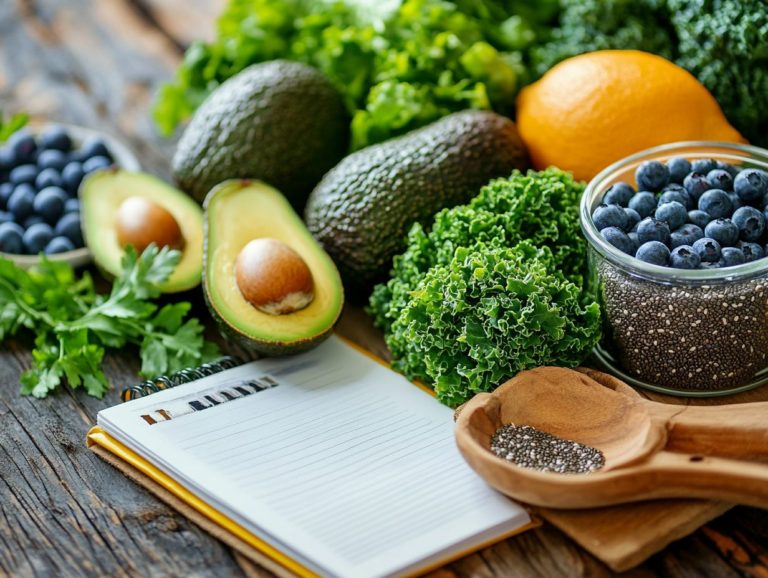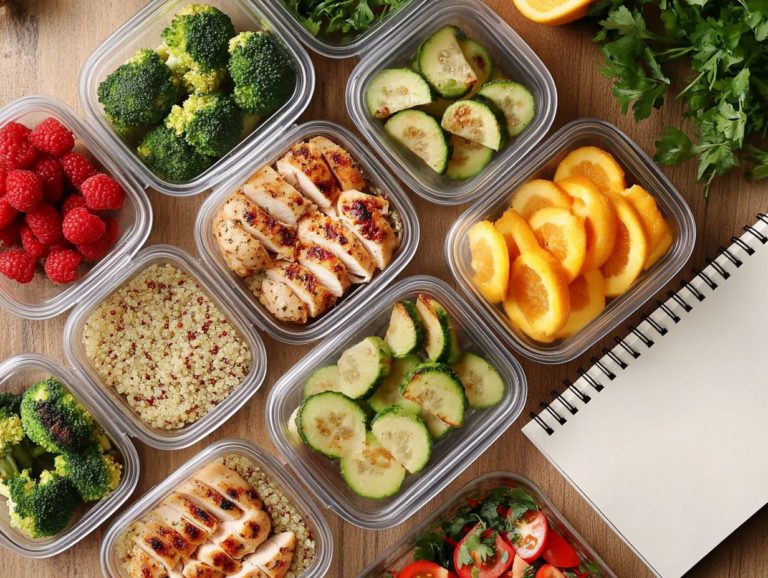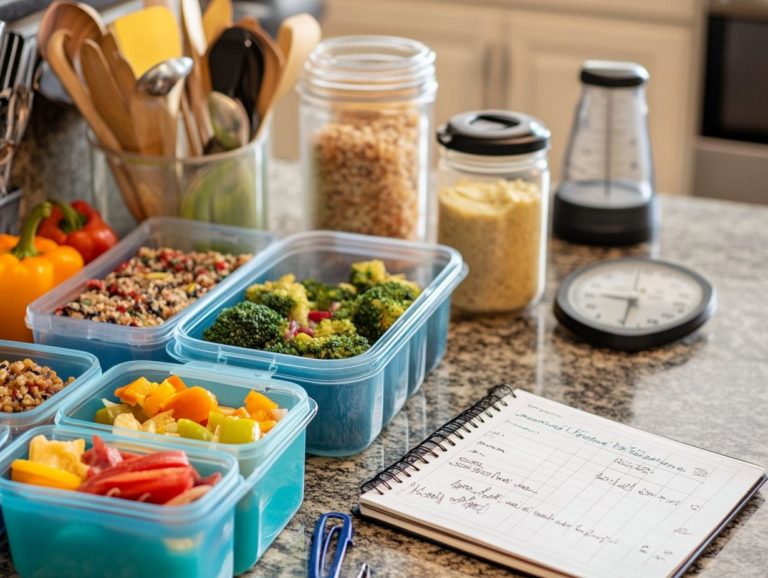5 Simple Meal Planning Ideas for Students
Meal planning can truly transform your experience as a student navigating the demands of classes, social engagements, and budgeting constraints.
By employing effective strategies, you can save time and money, make healthier eating choices, and minimize food waste. This article delves into five straightforward meal planning ideas specifically designed for busy students, from harnessing meal prep techniques to maximizing the potential of leftovers.
It also highlights how these practices can integrate smoothly into your daily routine and enhance your overall well-being. Don t miss out on how easy and rewarding meal planning can be!
Contents
- Key Takeaways:
- 1. Utilize Meal Prep
- 2. Plan Meals Around Budget-Friendly Ingredients
- 3. Incorporate Leftovers
- 4. Use Online Resources for Meal Ideas
- 5. Make Use of Kitchen Appliances
- What Are the Benefits of Meal Planning for Students?
- What Are Some Quick and Easy Meal Ideas for Students?
- How Can Students Make Meal Planning a Part of Their Routine?
- What Are Some Tips for Staying Organized with Meal Planning?
- How Can Meal Planning Help Improve Overall Health and Nutrition?
- Frequently Asked Questions
- What are 5 simple meal planning ideas for students?
- How can meal planning benefit students?
- Why is it important for students to have a balanced meal plan?
- What are some healthy and budget-friendly meal ideas for students?
- How can students make meal planning more fun and creative?
- Can meal planning help students avoid unhealthy eating habits?
Key Takeaways:
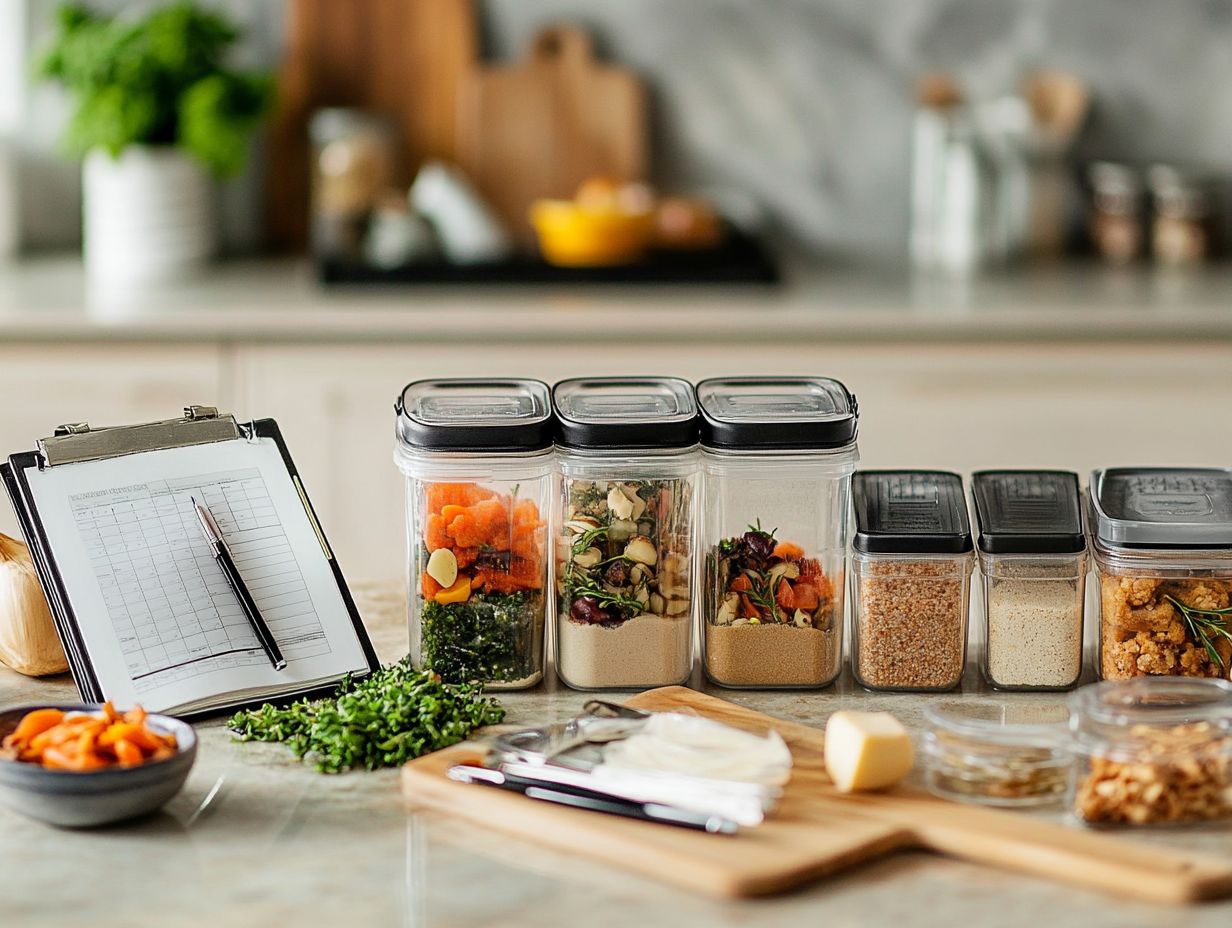
Utilize meal prep to save time and ensure you have healthy meals readily available.
Plan meals around budget-friendly ingredients to save money and minimize food waste.
Incorporate leftovers into your meal planning to make the most out of your groceries.
1. Utilize Meal Prep
Utilizing meal prep is a transformative approach to meal planning that not only saves you time but also significantly reduces food waste. This allows you to indulge in healthy recipes while learning cooking techniques to improve your skills.
By pre-planning your meals, you can streamline the entire cooking process, making it quicker and easier to whip up dishes during those busy weekdays.
Crafting a grocery list becomes a breeze, ensuring you purchase only the necessary ingredients, which helps keep your budget in check.
Various meal prep methods, like batch cooking or using freezer-friendly recipes, enable you to optimize your practice, ensuring every ingredient is utilized effectively while minimizing spoilage.
Techniques such as portioning out servings or using versatile ingredients can enhance your meal prep routine, leading to a more organized and sustainable kitchen.
2. Plan Meals Around Budget-Friendly Ingredients
Planning your meals around budget-friendly ingredients is a savvy approach that enhances your food budgeting skills and unlocks a treasure trove of healthy recipes that are both delicious and affordable. This makes it much easier for you to adhere to effective meal planning tips.
By prioritizing seasonal and local ingredients, you can significantly cut down on grocery bills while supporting local farmers and boosting community economies.
Fresh produce harvested at its peak delivers superior flavor and often comes at a lower price than out-of-season items. For example, shopping at farmers’ markets or joining a community-supported agriculture (CSA) program can lead to remarkable savings.
Establishing a weekly grocery shopping routine perhaps on a Sunday when fresh stock arrives can help you create a consistent inventory of meals. This allows for strategic planning and minimizes those pesky impulse purchases.
Buying staples like rice, beans, and oats in bulk stretches your budget even further while providing a solid foundation for countless nourishing meals.
3. Incorporate Leftovers
Incorporating leftovers into your meal planning is a smart strategy for creating a delightful variety of meals while minimizing food waste. By transforming simple dishes into exciting new creations throughout the week, you can elevate your dining experience.
When you creatively reimagine what s already in your fridge, you not only extend the lifespan of your ingredients but also enhance your nutrition. For instance, leftover roasted vegetables can easily be revitalized as a vibrant addition to a frittata or a hearty soup.
Yesterday s grilled chicken can be shredded and tossed into a refreshing salad or wrapped in a tortilla with fresh salsa for a quick and satisfying lunch.
A small stash of grains, like quinoa or rice, can serve as the perfect base for a nourishing grain bowl, topped with whatever fresh ingredients you have on hand.
By experimenting with herbs, spices, and dressings, you can further elevate these repurposed meals, keeping the flavors exciting and uncovering delightful new combinations.
Start meal planning today to experience these immediate benefits and enjoy a more balanced lifestyle!
4. Use Online Resources for Meal Ideas
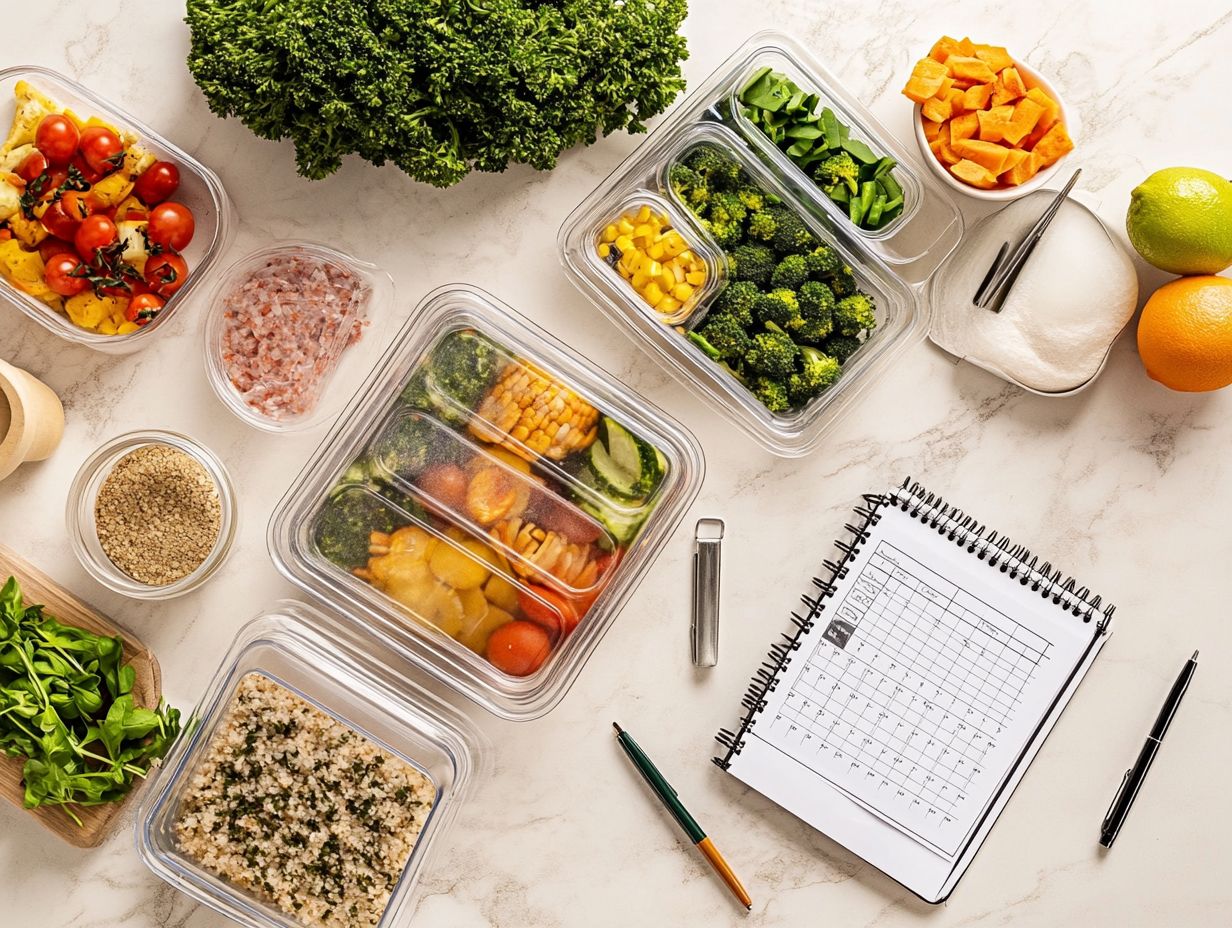
Utilizing online resources for meal ideas is a great way to find recipe inspiration. You can discover a wealth of healthy meals and innovative cooking techniques tailored to your diverse dietary needs.
From vibrant food blogs focused on specific dietary restrictions to engaging social media accounts, these platforms are full of quick and nutritious recipes waiting to be explored.
Video tutorials offer step-by-step guidance, making it easy for you to follow along and master new skills in the kitchen.
Whether you re craving gluten-free options, vegan meals, or family-friendly dishes, numerous online communities are ready to provide personalized recipes and meal planning strategies.
By tapping into these resources, you can explore a world of culinary possibilities while ensuring your meal planning aligns perfectly with your health goals and personal tastes.
5. Make Use of Kitchen Appliances
Using kitchen appliances like slow cookers, blenders, and air fryers can transform your meal prep routine. These tools enable efficient cooking and the easy creation of frozen meals ready to enjoy any day of the week.
Integrating these appliances into your daily life helps you reclaim valuable time while still enjoying nutritious, homemade dishes.
For instance, a slow cooker is a pot that cooks food slowly over several hours. Just toss in your ingredients in the morning, and by dinner, a perfectly cooked meal will be waiting for you.
Blenders can whip up smoothies or sauces in mere minutes, making healthy eating a breeze even on your busiest days.
Air fryers offer a speedy alternative to traditional frying methods, delivering crispy and flavorful meals with significantly less oil.
These versatile tools streamline meal preparation and help you maintain a balanced diet without sacrificing quality or taste.
What Are the Benefits of Meal Planning for Students?
Meal planning presents a wealth of benefits for college students. It enables you to navigate your hectic schedules effortlessly while maintaining a healthy diet and budget-friendly meals that support your academic and personal well-being.
Organizing your meals in advance significantly reduces the stress that often comes with last-minute food decisions, which frequently lead to unhealthy choices and overspending.
Prep your meals today and discover how easy healthy eating can be! You enhance your dietary choices by including nutritious ingredients and save money by buying groceries in bulk and reducing food waste.
With a structured approach, it becomes easier to align your meals with healthy eating so you can perform at your best throughout the semester.
How Can Meal Planning Help Save Time and Money?
Meal planning can be your secret weapon for saving both time and money. By crafting an organized grocery list focused on budget-friendly meals, you ll cut down on impulse purchases and significantly reduce food waste.
When you plan your meals for the week, you shop with intention. This approach helps you choose nutritious options that align with your preferences while bringing order to your busy weekdays.
By prioritizing essential ingredients, you ll find yourself wandering the aisles far less, which means fewer temptations to make unnecessary purchases. Create a grocery list tailored to your planned meals to help stick to your budget and ensure you have everything required for preparation.
And don t forget to consider seasonal produce and local sales this savvy strategy can stretch your grocery budget without compromising on quality.
Start exploring these online resources now and see how easy meal planning can be!
What Are Some Quick and Easy Meal Ideas for Students?
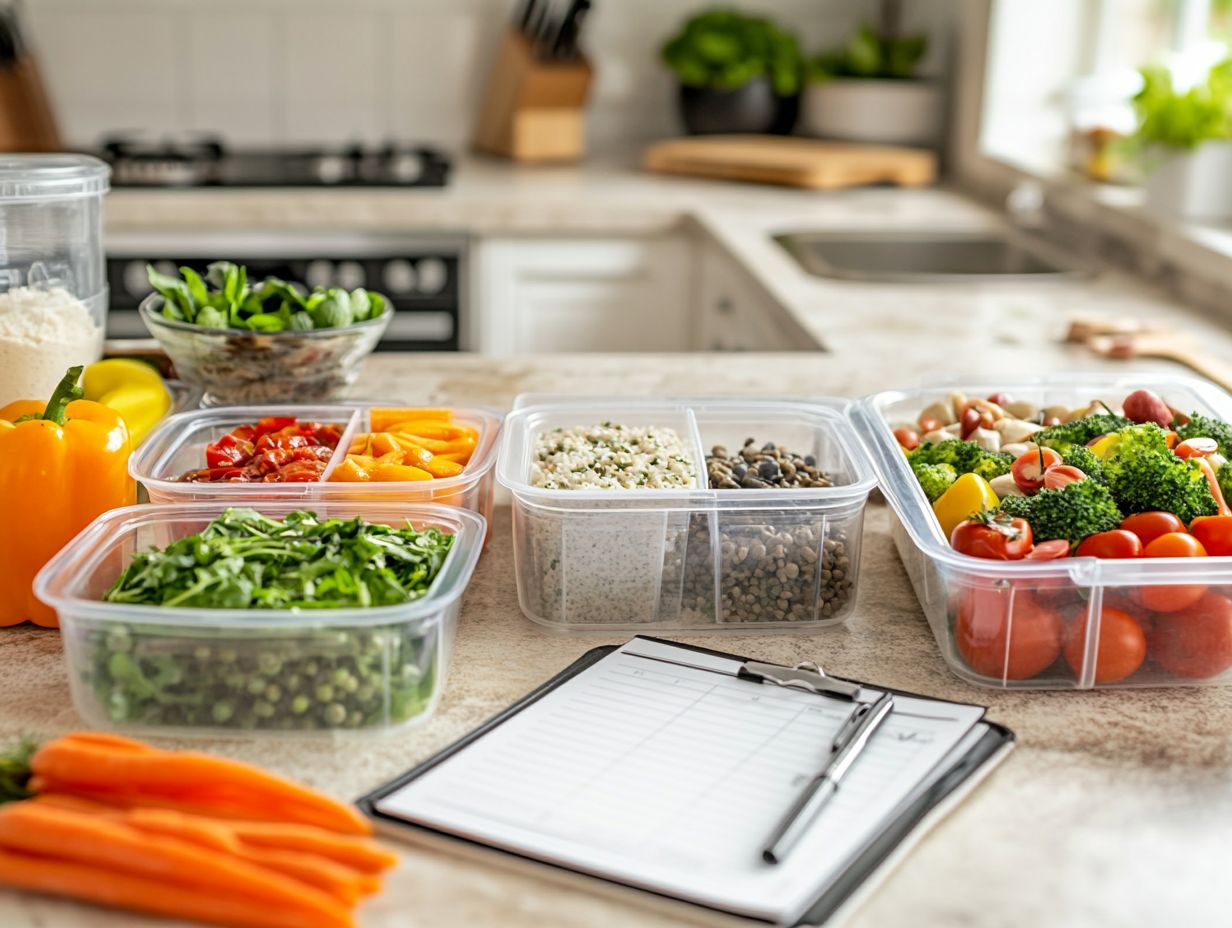
Quick and easy meal ideas can transform your busy weeknights.
These meals offer healthy recipes that require minimal prep time without sacrificing flavor or nutrition.
They are designed to fit seamlessly into your tight schedule while prioritizing balanced nutrition. For example, stir-fry frozen vegetables with quick-cooking grains like quinoa or brown rice. You can whip up a nutritious bowl in under 15 minutes, leaving you plenty of time for other important tasks.
Batch cooking (preparing a large quantity of food at once) on weekends can be a game changer. It significantly simplifies your weekday cooking, allowing for effortless assembly of meals like whole grain wraps filled with lean protein and fresh greens.
By utilizing versatile ingredients, you can keep your meals exciting, minimize waste, and save precious time all while enjoying delicious food that supports your busy lifestyle.
How Can Students Make Meal Planning a Part of Their Routine?
Integrating meal planning into your routine can enhance your cooking skills and cultivate healthier eating habits. It effectively transforms your weekly schedule into a well-structured approach to nutrition.
By dedicating specific time blocks during the week for meal preparation, you streamline your grocery shopping and eliminate frantic last-minute food decisions.
Using templates for meal planning simplifies the process and encourages you to experiment with a variety of ingredients.
Involve your roommates or friends to make meal prep a fun social activity, where everyone contributes a dish. This fosters a sense of community and shared responsibility.
This collaborative effort saves time and promotes diverse eating habits, making healthy choices more enjoyable for everyone involved.
What Are Some Tips for Staying Organized with Meal Planning?
Staying organized with meal planning can elevate your overall cooking experience. By maintaining a clear grocery list, utilizing meal templates, and implementing effective cooking techniques, you can simplify meal prep and make it enjoyable.
When you schedule your meals for the week ahead, you ensure that all necessary ingredients are available. This minimizes last-minute trips to the grocery store and cuts down on food waste.
Creating a grocery list streamlines your shopping trips and helps you avoid tempting impulse buys that can derail your budget and health goals.
Meal templates provide variety while keeping your cooking habits consistent. Flexibility is essential in meal planning; having a couple of backup options ready can reduce stress when unexpected events arise.
How Can Meal Planning Help Improve Overall Health and Nutrition?
Meal planning can profoundly enhance your overall health and nutrition by encouraging conscious eating habits. It ensures balanced meals that cater to your dietary needs and preferences.
Investing time in preparing your meals in advance diminishes the allure of convenient but less nutritious takeout options that often lead to impulsive eating.
This proactive approach nurtures healthier choices and enables you to take charge of the ingredients you incorporate. It becomes easier to sidestep unhealthy additives and excess sugars.
When you outline meals that align with your specific nutritional goals like boosting protein intake or trimming calories it s simpler to stay on track and enjoy a satisfying eating experience.
Frequently Asked Questions
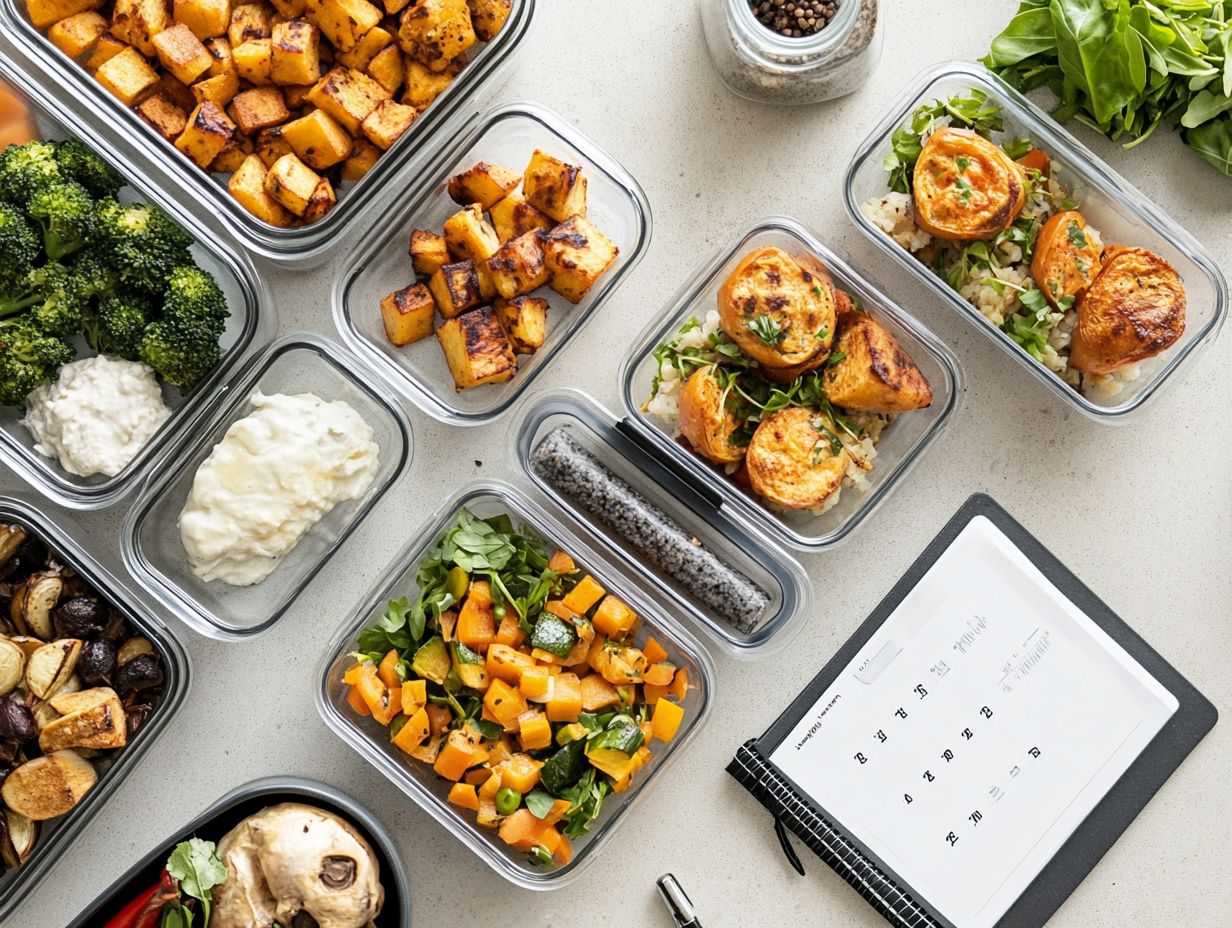
What are 5 simple meal planning ideas for students?
1. Make a weekly meal plan: Sit down at the start of each week to plan your meals. This saves time and money while ensuring healthy, balanced meals.
2. Cook in batches: Prepare extra portions and freeze them for later. You ll always have a healthy meal ready, even when you’re busy.
3. Use leftovers creatively: Don t waste leftovers! Turn leftover rice into stir-fry or use leftover chicken for tacos. Get creative!
4. Incorporate versatile ingredients: Stock up on beans, rice, and pasta. These ingredients are affordable and can be used in many meals.
5. Meal prep on the weekends: Use your weekends to prep ingredients. This will make your busy weekdays much easier.
How can meal planning benefit students?
Meal planning helps students save time and money. It also encourages healthier eating and reduces stress.
Why is it important for students to have a balanced meal plan?
A balanced meal plan provides the nutrients needed for physical and mental well-being. It improves focus and concentration, enhancing academic performance.
What are some healthy and budget-friendly meal ideas for students?
- Stir-fries
- Omelettes
- Wraps
- Sandwiches
- Pasta dishes
These meals are quick, easy, and customizable.
How can students make meal planning more fun and creative?
Students can try new recipes and add different spices for flavor. Involving friends in cooking nights can also spark new meal ideas.
Can meal planning help students avoid unhealthy eating habits?
Yes! Meal planning ensures nutritious meals are always available. It helps avoid reliance on fast food when time is tight.



